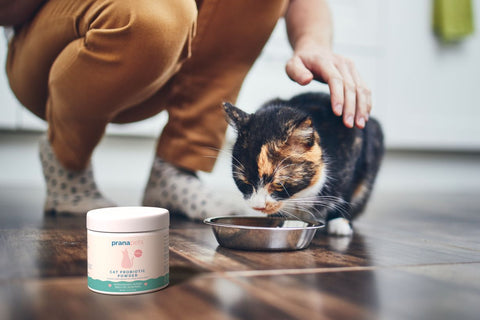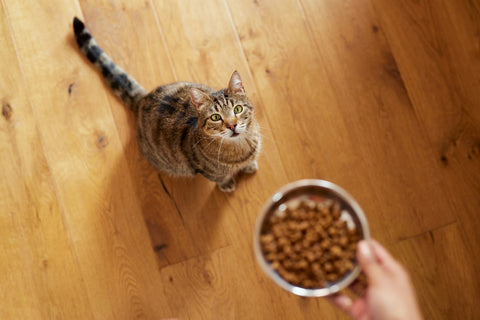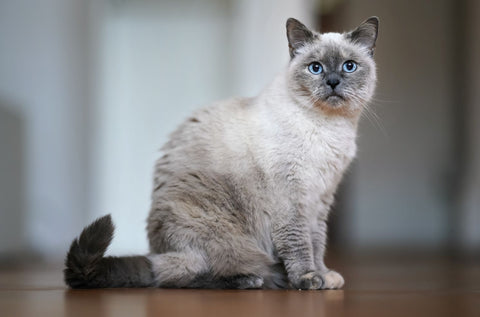

Natural Ways to Improve Digestive Health for Cats
Cats, just like humans, can experience digestive issues that affect their overall health and well-being. A healthy digestive system is crucial for our feline friends as it helps them absorb essential nutrients, maintain a strong immune system, and prevent various health problems. If your kitty is experiencing digestive issues, such as ulcerative colitis, there are natural ways to improve their gut health and promote better digestion. In this blog, we will explore the role of diet, including the importance of a well-balanced cat’s diet, the power of probiotics and prebiotics, natural herbs, environmental factors, warning signs of digestive issues, and preventive care when considering the cat’s digestive system.
How can you improve a cat's digestive health through diet?
Improving a cat's digestive health can be done through diet by providing them with a balanced and high-quality cat food that is easily digestible. Adding probiotics and digestive enzymes to their diet can also help improve gut health and promote better digestion for cats.
The Role of Diet in Cat's Digestive Health
A cat's diet plays a crucial role in maintaining their digestive health. The food they consume directly impacts their gut health, nutrient absorption, and overall digestive system. Providing a balanced diet, tailored to your cat's metabolism, is key to supporting healthy digestion in cats and ensuring they receive the necessary nutrients for optimal health. Let's dive deeper into the importance of a balanced diet, adapted to your cat's metabolism, for your cat's digestive health. A diet that is specifically formulated for your cat's metabolism can greatly improve their gut health and overall well-being.
Importance of Balanced Diet
A balanced diet is essential for cats, as it supports their digestive health, nutrient absorption, and overall well-being. When cats consume a balanced diet, their digestive system can effectively break down food, absorb nutrients, and eliminate waste. This promotes regular bowel movements and prevents digestive issues such as constipation or diarrhea. Choosing a diet adapted to your cat’s needs is a key factor in maintaining a healthy digestive system, including a cat food specially formulated to help support your cat’s natural defenses and the health of their intestinal tract. Consumption of heat-treated lactobacilli has been proven to help support natural antibody production in a healthy cat's intestinal tract, while essential fatty acids like Omega-3 and Omega-6 help support healthy skin and a radiant coat.
A balanced diet also plays a vital role in supporting other aspects of a cat's health, including their immune system. A healthy gut microbiome, which is maintained through a balanced diet, contributes to a stronger immune system, reducing the risk of infections and diseases.
To ensure your cat's digestive health, provide a diet that includes high-quality sources of protein, healthy carbohydrates, and essential nutrients. Avoid feeding your cat excessive amounts of treats or human food, as this can disrupt their digestive system and lead to weight gain or nutrient imbalances.
Role of Proteins and Carbohydrates
Proteins and carbohydrates are key components of a cat's balanced diet and play a significant role in their digestive health. Proteins, especially those found in raw meat, are particularly important for obligate carnivores like cats, as they require a higher percentage of protein in their diet compared to other animals. High-quality animal-based proteins, such as chicken, fish, or turkey, provide the necessary amino acids for cats' overall health.
Proteins support digestive health by aiding in the breakdown of food, facilitating nutrient absorption, and promoting muscle development and repair. They also contribute to weight management, as protein-rich diets can help cats maintain a healthy weight, reducing the risk of digestive issues such as obesity or pancreatitis.
Carbohydrates, on the other hand, provide a source of energy for cats. While cats have a limited ability to digest carbohydrates, small amounts of digestible carbohydrates can still be beneficial for their digestive health. Grains, such as rice or oats, and vegetables like sweet potatoes or peas, can provide cats with essential dietary fiber, which aids in digestion and promotes regular bowel movements.
articlebanners1
The Power of Probiotics and Prebiotics
Probiotics and prebiotics are powerful allies in promoting a healthy gut microbiome for cats. A balanced gut microbiome is essential for optimal digestive health, nutrient absorption, and overall immune system function. Let's further explore the benefits of probiotics and prebiotics for your cat's digestive system.
Understanding Probiotics
Probiotics are beneficial bacteria that support a healthy digestive system in cats. These friendly bacteria help maintain a balanced gut microbiome, supporting nutrient absorption and promoting overall well-being. Probiotics can also enhance the immune system, making cats less susceptible to infections and digestive disturbances.
By introducing probiotics into your cat's diet, you can create an optimal environment for beneficial gut bacteria to thrive. Probiotics improve the balance of microorganisms in the digestive tract, making it easier for cats to digest food, absorb nutrients, and eliminate waste.
When choosing a probiotic for your cat, it's important to select a product specifically formulated for feline digestive health. Consult with your veterinarian, as they can recommend the most suitable probiotic for your cat's needs. Remember, gradual dietary changes are recommended when introducing probiotics to your cat's diet.
Understanding Prebiotics
While probiotics introduce beneficial bacteria into the digestive system, prebiotics provide nourishment for these beneficial gut bacteria. Prebiotics are a type of dietary fiber that humans and animals cannot digest, but they serve as food for gut bacteria, promoting their growth and activity.
Incorporating prebiotics into your cat's diet can support digestive health and maintain a balanced gut microbiota. By providing beneficial bacteria with the necessary prebiotics, you create an environment where they can thrive, improving overall digestion and nutrient absorption.
Common sources of prebiotics for cats include fibers from fruits, vegetables, and whole grains. However, it's essential to introduce prebiotics gradually, as sudden changes to your cat's diet can lead to digestive upset. Consult with a veterinarian for specific dietary recommendations and guidance on incorporating prebiotics into your cat's diet.
Natural Herbs for Cat's Digestive Health
Natural herbs can provide beneficial support for your cat's digestive health, contributing to their overall well-being. Let's explore some common natural herbs known for their positive effects on cats' digestive systems.
Milk Thistle (Seed) and its Benefits
Milk thistle seeds are renowned for their beneficial effects on a cat's digestive health, particularly in supporting liver health and detoxification processes. The active components of milk thistle, such as silymarin, can protect the liver from toxins, reduce inflammation, and promote healthy liver function in cats. By adding milk thistle to your cat's diet, you can support their digestive system, helping to maintain overall health and vitality.
Alfalfa (Leaf) for Healthy Digestion
Alfalfa, known for its nutrient-rich properties, offers numerous benefits for cats' digestive health. The leafy green contains essential vitamins, minerals, and enzymes that support healthy digestion. The fiber content of alfalfa promotes regular bowel movements and aids in preventing constipation, contributing to optimal digestive health for cats. Incorporating alfalfa into your cat's diet can introduce a natural and nutrient-rich source of digestive support.
Ginger (Root) and its Role in Digestion
Ginger, a potent natural spice, serves as an effective digestive aid for cats. Its anti-inflammatory properties can help soothe digestive inflammation, reducing discomfort and promoting overall digestive health. Ginger can also aid in supporting regular bowel movements and reducing digestive upset in cats, making it a valuable addition to their diet.
Slippery Elm (Bark) and its Advantages
Slippery elm bark is known for its beneficial effects on cats' gastrointestinal health. It acts as a soothing agent, providing relief for various digestive issues such as irritable bowel syndrome or acid reflux. Slippery elm bark's mucilaginous properties create a protective coating in the digestive tract, reducing inflammation and promoting overall digestive well-being for cats.
Marshmallow (Root) for Digestive Health
Marshmallow root, rich in mucilage, provides excellent digestive support for cats. It forms a gel-like substance when combined with water, which can soothe and protect the digestive tract. Marshmallow root is beneficial for cats experiencing digestive issues such as inflammation, constipation, or gastric ulcers. By incorporating marshmallow root into your cat's diet, you can promote digestive health and reduce discomfort.
Pumpkin (Seed), Wormwood (Herb), and Anise (Fruit/Seed)
Certain natural herbs, such as pumpkin seeds, wormwood, and anise, offer additional digestive benefits for cats:
- Pumpkin seeds serve as a natural dewormer for cats, helping to expel intestinal parasites and promoting healthy digestion.
- Wormwood herb assists in maintaining cats' digestive systems, particularly for those experiencing digestive problems or upset stomachs.
- Anise seeds are beneficial for cats' digestive health, aiding in nutrient absorption and supporting digestive regularity.
- Including these natural remedies can contribute to better digestive health and overall well-being for cats.
Cloves, Black Walnut (Hull), Herb of Grace (Herb), Neem (Bark), Buckthorn (Bark)
Cloves, black walnut, herb of grace, neem, and buckthorn offer digestive health benefits for cats:
- Cloves serve as an antiparasitic agent, helping to rid cats of intestinal parasites that can disrupt digestive health.
- Black walnut hull has antifungal and antiparasitic properties, helping cats maintain a healthy digestive tract free from harmful organisms.
- Herb of Grace, also known as rue, supports cats' digestive health and can aid in digestive issues such as indigestion or gas.
- Neem bark acts as an antiparasitic, helping to combat intestinal parasites that can affect cats' digestive system.
- Buckthorn bark promotes regular bowel movements, making it beneficial for cats experiencing constipation or other digestive issues.
articlebanners2
Environmental Factors Influencing Digestive Health for Cats
In addition to diet and natural remedies, various environmental factors can influence cats' digestive health. Consider the key factors mentioned below for optimal digestive health in cats.
Importance of Exercise
Regular exercise is essential for cats' digestive health. Physical activity stimulates the digestive system, promoting regular bowel movements and ensuring healthy digestion. Exercise helps cats maintain a healthy weight, preventing issues like obesity that can lead to digestive problems. It also boosts metabolism, aiding in proper nutrient absorption and overall gut health. Encourage playtime and provide opportunities for your cat to engage in activities that promote exercise, such as interactive toys or climbing structures. Regular grooming, in addition to exercise, is important for cats' digestive health. This includes brushing their coat to prevent hair ingestion and constipation. Regular exercise and grooming, split into two different sessions of 20 minutes each, will boost your pet’s energy level and strengthen your relationship.
Mental Stimulation and Gut Health for Cats
Mental stimulation plays a significant role in cats' digestive health. Stress and anxiety can disrupt the digestive system, leading to digestive problems and health issues. Providing ample mental stimulation, such as puzzles and interactive toys, can help reduce stress levels and promote a healthy gut. Engaging your feline friend in playtime, training, or providing environmental enrichment can alleviate boredom, stimulate their mind, and support their overall digestive health.
Warning Signs of Digestive Issues in Cats
As a cat owner, it's important to be vigilant for any warning signs of digestive issues in your feline friend. Recognizing these signs early can help you address any potential health problems promptly. Pay attention to any subtle changes in your cat's litter box habits, grooming behavior, pet’s stools, energy levels, water intake, or the presence of large quantities of hair in their diet. If you notice any of these warning signs, such as a lack of sufficient water intake, it may be indicative of underlying digestive issues, and consulting with a veterinarian is recommended.
Symptoms to Look Out For
It's essential for cat parents to be aware of common symptoms that can indicate digestive issues in cats. If you notice any of the following symptoms, it is advisable to consult with a veterinarian for further evaluation and guidance:
- Vomiting: Frequent or chronic vomiting, especially if accompanied by changes in appetite or weight loss, may indicate digestive problems.
- Diarrhea: Persistent or recurring diarrhea can be a sign of digestive issues, food intolerances, or infections.
- Weight loss: Unexplained weight loss, despite a regular diet, may be indicative of underlying digestive problems or malabsorption issues.
- Abdominal pain: Cats experiencing abdominal pain may display symptoms such as discomfort, restlessness, or vocalization.
- Changes in appetite: A sudden or gradual change in appetite, such as loss of appetite or increased food intake, may suggest digestive issues or other health concerns.
- If you observe any of these symptoms in your cat, it is crucial to consult with a veterinarian for proper diagnosis and appropriate treatment.
Is Your Cat's Digestive Health at Risk?
Certain risk factors can increase the likelihood of digestive issues in cats. Understanding these risk factors can help you proactively address and manage your cat's digestive health.
Cat’s digestive health can be influenced by various factors, including diet, lifestyle, inflammatory bowel disease, and chronic inflammation. Cats with underlying health conditions, food allergies, or sensitivities may be more prone to digestive problems. Stress, changes in environment, and certain medications can also impact a cat's digestive health.
It's important for cat parents to be aware of these risk factors and take appropriate measures to mitigate them. By providing a balanced diet, regular veterinary care, stress reduction, and a healthy lifestyle, you can minimize the risk of digestive problems for your feline friend.
articlebanners3
Frequently Asked Questions
Are there any natural supplements or remedies that can improve a cat's digestive health?
Yes, there are natural supplements and remedies that can improve a cat's digestive health. Probiotics, for instance, are beneficial bacteria that support a healthy gut microbiome, and digestive enzymes can aid in nutrient absorption. Herbs such as ginger, slippery elm, or milk thistle have been found to support digestive health in cats. Additionally, introducing extra prebiotics into your cat's diet can also improve their digestive health and address skin issues. Always consult with a veterinarian before giving your cat any supplements or remedies, as they will guide you on the appropriate dosage and potential interactions with any existing health conditions or medications, especially when it comes to a diet change.
How can a cat's diet impact their digestive health?
A cat's diet can greatly impact their digestive health. Feeding them a balanced diet that meets their unique dietary needs can support gut health, reduce the risk of digestive issues, and promote overall well-being. A balanced diet should include high-quality protein sources, healthy carbohydrates, essential nutrients, and appropriate moisture levels. Avoid feeding your cat a diet high in fillers, additives, or artificial ingredients, as these can contribute to digestive issues and health risks. A gradual transition over several days, with the guidance of a veterinarian, can help ensure your cat's diet aligns with their digestive needs and allows their cats intestine to adjust to the new food.
How can I prevent digestive issues in my cat through lifestyle changes and environmental factors?
To prevent digestive issues in your cat, focus on their lifestyle and environment. Provide a high-quality, easily digestible diet and access to clean water. Encourage regular exercise and playtime for healthy digestion. Minimize stress and anxiety in their environment for optimal digestive health.
Prioritizing your cat's digestive health is crucial for their overall well-being. A balanced diet, rich in proteins and carbohydrates, plays a significant role in maintaining a healthy digestive system. Incorporating probiotics and prebiotics into their diet can also provide numerous benefits. Natural herbs like milk thistle, alfalfa, ginger, slippery elm, and marshmallow can further support digestion. Additionally, environmental factors such as exercise and mental stimulation contribute to a healthy digestive system. It's important to be aware of warning signs that indicate digestive issues and take action promptly. By making necessary lifestyle changes and providing the right diet, you can prevent digestive problems and ensure your cat lives a happy and healthy life.
articlebanners4




